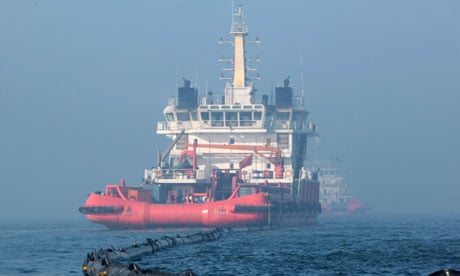The US oil company ConocoPhillips has yet to stem a seeping well that is contaminating China's Bohai Sea, but it resumed the clear-up operation on Tuesday with a promise that the work will be completed later this month.
The series of slicks, which have spread to about 1,200 square kilometres (460 square miles) since the first leak was discovered on 4 June, have alarmed environmentalists, fisherman and coastal communities – and remedial work has been delayed by technical problems and typhoons.
The Chinese government criticised ConocoPhillips at the weekend for a laggard response since a previously unreported accumulation of oil-based drilling mud was discovered on the seabed near the Penglai 19-3 platform B.
The company, which operates the field in partnership with the China National Offshore Oil Corporation, says it has more than 900 personnel and 30 vessels working on the response, but they had to suspend the operation when tropical storm Muifa hit the area yesterday.
Divers have now resumed efforts to choke the source of the oil mud on the seabed. Working with the State Oceanic Administration, the company said its priority was to stop the seepage, permanently.
The volume appears to be manageable. After platform C was closed, the sheen rising to the surface has been reduced to just two litres a day, and that is being captured by steel containment devices. The firm says it has recovered 269 cubic meters of oil-based drilling mud from the seabed, and 70 cubic meters oily water from the surface. It has promised the Chinese authorities that the work will be finished by 25 August.
The damage caused by the leak, however, remains uncertain.
Oil has washed up on beaches in Hebei and Liaoning. Chinese newspapers have also blamed the spill for damage to fisheries and the decimation of scallop farms. South Korean media reports say that Beijing has failed to respond to requests from Seoul for a joint assessment of the environmental impact.
